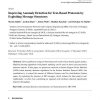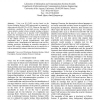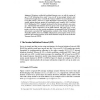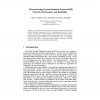131
click to vote
COMSUR
2011
14 years 1 months ago
2011
Abstract—Exchanging cryptographic keys to encrypt the media stream in the Session Initiation Protocol (SIP) has proven difficult. The challenge is to effectively exchange keys w...
131
click to vote
FI
2010
14 years 11 months ago
2010
: Service platforms using text-based protocols need to be protected against attacks. Machine-learning algorithms with pattern matching can be used to detect even previously unknown...
115
Voted
CORR
2008
Springer
15 years 1 months ago
2008
Springer
In this paper, we evaluate available steganographic techniques for SIP (Session Initiation Protocol) that can be used for creating covert channels during signaling phase of VoIP (V...
137
click to vote
COMCOM
2007
15 years 1 months ago
2007
— Voice over IP (VoIP) services based on the Session Initiation Protocol (SIP) gain ground as compared to other protocols like MGCP or H.323. However, the open SIP architecture c...
138
click to vote
JCM
2006
15 years 2 months ago
2006
Session Initiation Protocol (SIP) is a new signaling protocol designed to establish multimedia sessions in telecommunication networks. In this paper, we suggest the extension of SI...
106
click to vote
CN
2007
15 years 2 months ago
2007
The Session Initiation Protocol (SIP) is widely used as a call control protocol for Voice over IP (VoIP), and indeed commercial implementations are readily available off-the-shel...
104
click to vote
CORR
2010
Springer
15 years 2 months ago
2010
Springer
The Session Initiation Protocol (SIP) has become the most predominant protocol for Voice over Internet Protocol (VoIP) signaling. Security of SIP is an important consideration for...
119
click to vote
DFN
2004
15 years 3 months ago
2004
: Ubiquitous worldwide broadband Internet access as well the coming of age of VoIP technology have made Voice-over-IP an increasingly attractive and useful network application. Cur...
123
click to vote
ACSC
2009
IEEE
15 years 6 months ago
2009
IEEE
The Session Initiation Protocol (SIP) is one of the leading protocols for multimedia control over the Internet, including initiating, maintaining and terminating multimedia sessio...
123
click to vote
ISAS
2005
Springer
15 years 7 months ago
2005
Springer
— The Session Initiation Protocol (SIP) has emerged as the preferred Internet telephony signaling protocol for communications networks. In this capacity, it becomes increasingly ...





